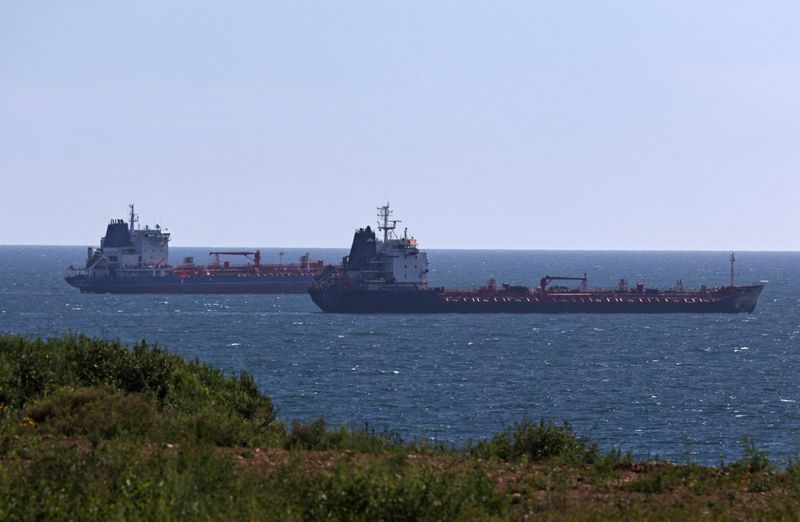
© Reuters. FILE PHOTO: Oil tankers sail along Nakhodka Bay near the port city of Nakhodka, Russia August 12, 2022. REUTERS/Tatiana Meel/File Photo
By Shariq Khan
NEW YORK (Reuters) -Global oil prices slid to their lowest since January on Tuesday, extending a downward trend as growing concerns about global demand offset any bullish effects from an EU-led price cap on Russian oil sales.
futures for February delivery were down $2.35, or 2.8%, to $80.33 a barrel at 11:38 am EDT [1638 GMT], the lowest since Jan. 10. West Texas Intermediate crude (WTI) fell $2.01, or 2.6%, to $74.92.
“In this market, the sentiment is more negative,” said Eli Tesfaye, senior market strategist at RJO Futures. “We could be looking at $60-a-barrel WTI the way that things are going. I think $80s are going to be the new high, and I would be very surprised to see any higher than that.”
Service-sector activity in China recently hit a six-month low, and European economies have slowed due to the high cost of energy and rising interest rates.
Crude futures on Monday recorded their biggest daily drop in two weeks after U.S. services industry data indicated a strong U.S. economy and drove expectations of higher interest rates than recently forecast.
The edged lower on Tuesday but was still buoyed by bets on higher interest rates, following the biggest rally in two weeks on Monday.
A stronger greenback makes dollar-denominated oil more expensive for buyers holding other currencies, reducing demand.
In China, more cities are easing COVID-19-related curbs, prompting expectations of increased demand in the world’s top oil importer, although that has not been enough to rally futures.
The market was weighing the production impact of a price cap of $60 per barrel on Russian crude imposed by Group of Seven (G7) nations, the European Union and Australia, contributing to market volatility. So far there is a “lack of an impact on Russian flows”, said Matt Smith, lead oil analyst at Kpler.
“Russian seaborne exports and production are just not dropping, along with fears of further rate hikes – crude is getting swept up in the risk-off tilt of broader markets,” Smith said.
Russia has said it will not sell oil to anyone who signs up to the price cap. Russia’s January-November oil and gas condensate production rose 2.2% from a year earlier to 488 million tonnes, according to Deputy Prime Minister Alexander Novak, who expects a slight output decline following the latest sanctions.
Stay connected with us on social media platform for instant update click here to join our Twitter, & Facebook
We are now on Telegram. Click here to join our channel (@TechiUpdate) and stay updated with the latest Technology headlines.
For all the latest Business News Click Here
For the latest news and updates, follow us on Google News.
